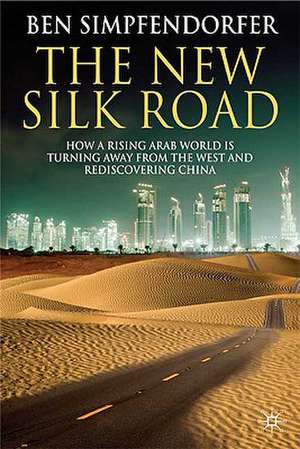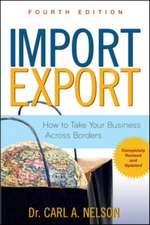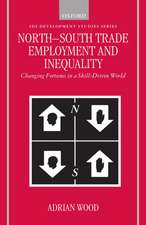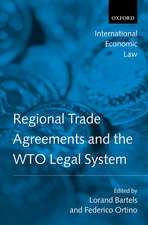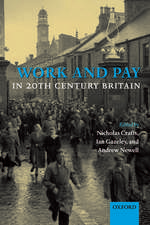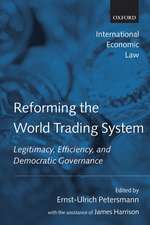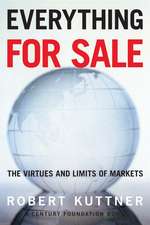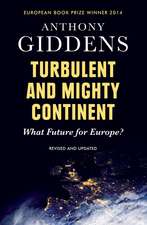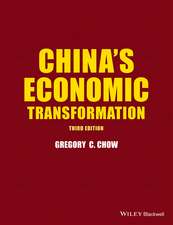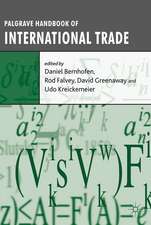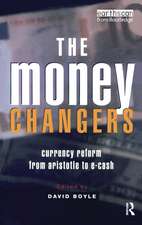The New Silk Road: How a Rising Arab World is Turning Away from the West and Rediscovering China
Autor B. Simpfendorferen Limba Engleză Hardback – 22 apr 2009
| Toate formatele și edițiile | Preț | Express |
|---|---|---|
| Paperback (1) | 383.33 lei 6-8 săpt. | |
| Palgrave Macmillan UK – 22 apr 2009 | 383.33 lei 6-8 săpt. | |
| Hardback (1) | 391.61 lei 6-8 săpt. | |
| Palgrave Macmillan UK – 22 apr 2009 | 391.61 lei 6-8 săpt. |
Preț: 391.61 lei
Nou
Puncte Express: 587
Preț estimativ în valută:
74.94€ • 78.44$ • 62.37£
74.94€ • 78.44$ • 62.37£
Carte tipărită la comandă
Livrare economică 31 martie-14 aprilie
Preluare comenzi: 021 569.72.76
Specificații
ISBN-13: 9780230580268
ISBN-10: 0230580262
Pagini: 202
Ilustrații: V, 202 p.
Dimensiuni: 155 x 235 x 18 mm
Greutate: 0.5 kg
Ediția:2009
Editura: Palgrave Macmillan UK
Colecția Palgrave Macmillan
Locul publicării:London, United Kingdom
ISBN-10: 0230580262
Pagini: 202
Ilustrații: V, 202 p.
Dimensiuni: 155 x 235 x 18 mm
Greutate: 0.5 kg
Ediția:2009
Editura: Palgrave Macmillan UK
Colecția Palgrave Macmillan
Locul publicării:London, United Kingdom
Cuprins
Preface The New Silk Road: The Arab world rediscovers China Chinese petrodollars and the Competition for Oil The Arab Wealth Funds and the Rise of an 'Islamic Corridor' Syria Learns From China while the Chinese 'Go Global' Arabic and the Language of Globalization Young Women and the Future of the Arab World The New Public Relations War: 'Al Jazeera' in China Implications for the West: A New Center of Gravity
Recenzii
'Simpfendorfer is not just a good economist but an artful story teller who entertains as he educates. He has written a highly readable treatment of a topic of great strategic significance - the rebalancing of global wealth and power through the emerging relationship between the Islamic world and China. 'The New Silk Road' is a glimpse of the future that is easy to get into and hard to put down.' - Chas W. Freeman, Jr., former US chargé at Beijing and Ambassador to Saudi Arabia.
'Despite the global economic crisis, the trajectory of the Arab and Chinese economies still match the soaring skylines of Dubai and Shanghai. Furthermore, as Ben Simpfendorfer bracingly illustrates, these are not isolated events but rather the resurrection of a Silk Road symbiosis. For all the region's troubles, this book places the Persian Gulf back where it geographically belongs: at the center of Eurasia and bending towards the overwhelming gravity of China.' - Parag Khanna, author of 'The Second World' and Senior Research Fellow at the New America Foundation
'The macroeconomics of China's rise and the nitty-gritty of Chinese businesses bargaining on the ground in the Arab world are like Parisian courtesans and Eskimos: world's apart, and nearly impossible to reconcile into a single narrative. But Ben Simpfendorfer's New Silk Road provides a Rosetta Stone to achieve just such a reconciliation. With an economists' toolbox for mapping aggregate growth, and a diarists' talentfor capturing the minute, human interactions that join executives and officials from these two ancient worlds, he makes the logic, limits and significance of Sino-Arab engagement understandable.' Daniel Rosen, Principle, Rhodium Group, LLC
'As the chief China economist for Royal Bank of Scotland in Hong Kong and a former resident of both Beirut and Damascus, Mr Simpfendorfer is well placed to tackle the subject. But although he is a professional economist, what sets Mr Simpfendorfer's book aside from the usual run of publications about the mainland's rise is not his command of macroeconomic statistics, but his grasp of how the expanding relationship between China and the Arab world works at the personal level.' - Tom Holland, South China Morning Post
'Despite the global economic crisis, the trajectory of the Arab and Chinese economies still match the soaring skylines of Dubai and Shanghai. Furthermore, as Ben Simpfendorfer bracingly illustrates, these are not isolated events but rather the resurrection of a Silk Road symbiosis. For all the region's troubles, this book places the Persian Gulf back where it geographically belongs: at the center of Eurasia and bending towards the overwhelming gravity of China.' - Parag Khanna, author of 'The Second World' and Senior Research Fellow at the New America Foundation
'The macroeconomics of China's rise and the nitty-gritty of Chinese businesses bargaining on the ground in the Arab world are like Parisian courtesans and Eskimos: world's apart, and nearly impossible to reconcile into a single narrative. But Ben Simpfendorfer's New Silk Road provides a Rosetta Stone to achieve just such a reconciliation. With an economists' toolbox for mapping aggregate growth, and a diarists' talentfor capturing the minute, human interactions that join executives and officials from these two ancient worlds, he makes the logic, limits and significance of Sino-Arab engagement understandable.' Daniel Rosen, Principle, Rhodium Group, LLC
'As the chief China economist for Royal Bank of Scotland in Hong Kong and a former resident of both Beirut and Damascus, Mr Simpfendorfer is well placed to tackle the subject. But although he is a professional economist, what sets Mr Simpfendorfer's book aside from the usual run of publications about the mainland's rise is not his command of macroeconomic statistics, but his grasp of how the expanding relationship between China and the Arab world works at the personal level.' - Tom Holland, South China Morning Post
Notă biografică
BEN SIMPFENDORFER is currently the Chief China Economist at the Royal Bank of Scotland in Hong Kong and was previously the Senior China economist at JPMorgan in Hong Kong. He has lived in Beijing, Beirut, Damascus, and Hong Kong where he writes for the foreign business and investment community. He appears regularly on Bloomberg and CNBC and is quoted in such major publications as the Financial Times and The New York Times. Simpfendorfer speaks Arabic and Chinese and has spent fifteen years reading local newspapers, speaking with the everyday person on the streets of Beirut to Beijing, and assessing economic data from the two regions. He has immersed himself in the two cultures and has personally observed many of the watershed events that have unfolded in the Arab world and China during that time.
